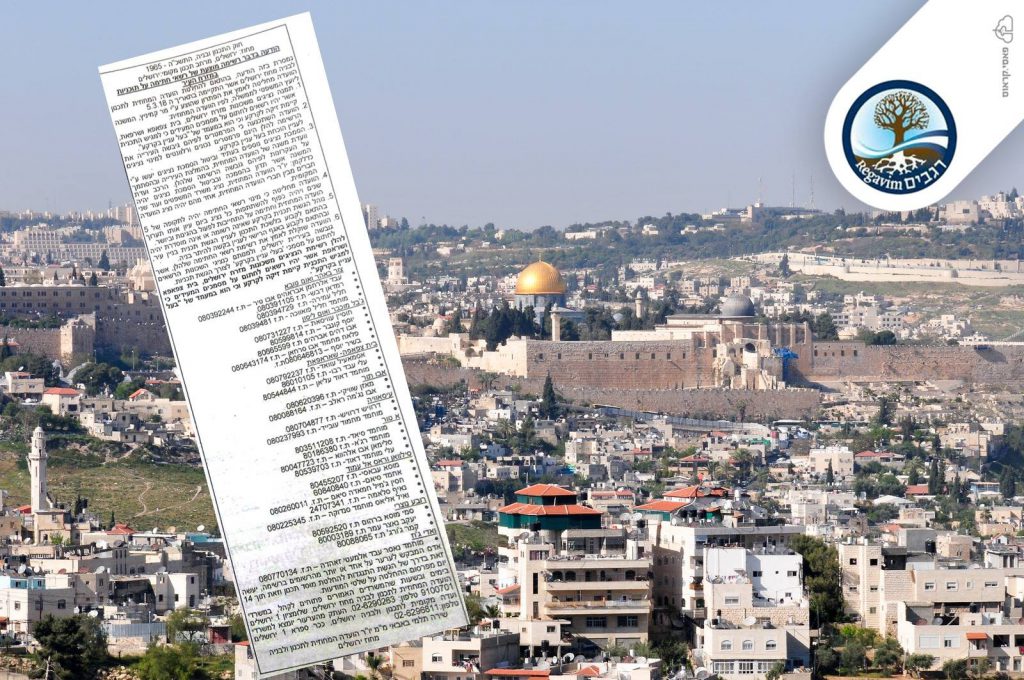
Four years after we set out to abolish the problematic procedure by which property ownership was determined in East Jerusalem, the Mukhtar Protocol has been revoked.
The Mukhtar Protocol was one of the most corrupt, discriminatory procedures enforced by the State of Israel. In a nutshell, this longstanding procedural practice, which was used to establish ownership and as the basis for construction permits and other legal processes, replaced the requirement for documented proof of ownership with the say-so of local village
“experts.” In East Jerusalem, the testimony of al local village chief (mukhtar) sufficed, as opposed to the burden of proof – actual Tabu records, deeds, or other documentation with legal standing and verifiability – required everywhere else. This strange, antiquated procedure was an open invitation to widespread fraud, resulting in the violation of proprietary rights of both Jewish and Arab owners.
Four years ago, when the Ministry of Justice attempted to revise and update the list of recognized mukhtars, a coalition of organizations was formed to fight the municipal and national bodies seeking to perpetuate this problematic procedure.
As part of the public campaign against the Mukhtar Protocol, Regavim led a series of meetings with the professionals in the Jerusalem Municipality responsible for land-use issues. The meetings were attended by Jerusalem-focused Zionist organizations including Elad, Ateret Cohanim, BeTzedek, Keep Jerusalem and others. We also spearheaded a public awareness and protest campaign against this dangerous and harmful procedure that has resulted in the illegal transfer of land to Arabs with specious claims. Notable champions of this campaign were MK Orit Strock, Deputy Mayor Arieh King, and Jerusalem Assemblyman Yoni Yosef, who joined us in actively fighting for the cancellation of the protocol.
Their efforts and ours were rewarded at last: On Friday 24 June, the Mukhtar Protocol was retired.
Yehudah Poah, Director of Betzalmo: “We welcome this decision. East Jerusalem is no different than anywhere else in the State of Israel. Our sovereignty and the rule of law there should be 100%.”
Attorney Boaz Arzi, Director of Regavim’s Legal Division, added: “The State of Israel should have conducted full regulation procedures for all properties in Jerusalem immediately upon the city’s reunification, and the foot-dragging has resulted in the loss of thousands of dunams of land to fraudulent claims and the erosion of governance. We congratulate the Ministry of Justice for its efforts to end this ongoing failure and cancel the dubious procedure, and hope that the process of land regulation and registration will be completed quickly and resolutely.”
Keep Jerusalem welcomed the decision: “Today, a significant step was made for the protection of the unity of Jerusalem and for Israeli sovereignty over its capital. We congratulate all of those who worked for this change, particularly the nationalist organizations, Minister Ayelet Shaked and Mayor Moshe Lion.”
Attorney Eldad Rabinowitz of “BeTzedek”: “We congratulate the Ministry of Justice for its decision to cancel the Mukhtar Protocol, which was an illegal procedure that resulted in large-scale land theft and undermined Israeli sovereignty in East Jerusalem. We expect the Jerusalem Municipality to uphold and enforce this decision and stop granting construction permits on the basis of the protocol that has now been discarded.”
Related Posts
A New Dawn in the Battle for Judea and Samaria
Meir Deutsch, Director General for The Regavim Movement Published in Israel Hayom, December 18th, 2024 For the first time in a decade, there’s been an unprecedented decline in illegal Palestinian construction in Area C, coupled with a significant increase in enforcement actions by the Civil Administration. This isn’t just a statistic; it’s a beacon of […]
Ground-breaking verdict brings hope for justice in the Negev
Beer Sheva District Court instructs the government to remove the squatters of Al Zarnog: “The State cannot condone the violation of individual proprietary rights.” A decisively-worded verdict was recently handed down by Judge Chani Slotki of the Be’er Sheva District Court, in a petition demanding that enforcement procedures be taken against hundreds of Bedouin squatters […]








